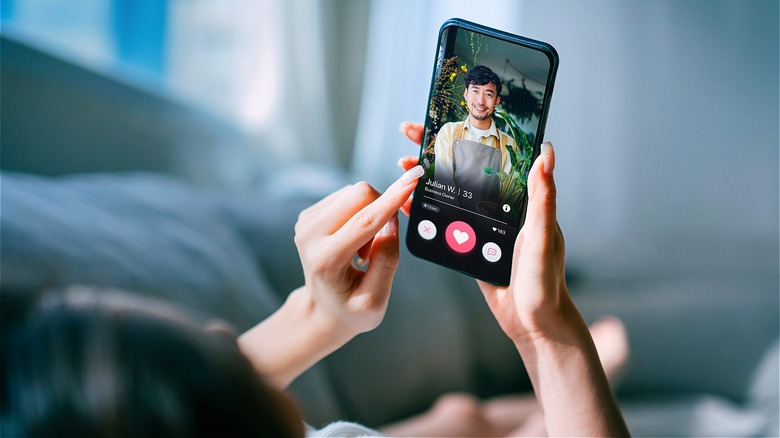The Alarming Reasons People Are Paying For Dating Apps Today
Thanks to apps like Hinge, Tinder, and Bumble, dating today is more convenient than ever. Gone are the days of having to be in a social setting (or even leave the house) to strike up a conversation with a potential love interest. Now, all one has to do is create a profile and swipe, swipe, swipe.
Still, despite the convenience of having countless singles at our fingertips, finding a compatible match is somehow more difficult these days than ever. According to a Pew Research Center study on online dating in the United States (in 2023), 57% of men reported having a positive experience with online dating, while women were more evenly divided, with 48% reporting a positive experience versus 51% reporting a negative one. In an effort to expand the pool, 35% of online daters have splurged for premium features on these otherwise free apps.
And if paying a monthly fee helps that one "Friends" fan find their lobster in a sea of Jim Halperts looking for their Pam Beesly, that's a great thing, right? Well, not necessarily. Often, the algorithms make it nearly impossible for users of the free version to see people of true interest, hiding the "best" prospects behind paywalls and leaving frustrated singles no choice but to either give up or grab their credit card. In fact, a lawsuit against Match Group, owner of Tinder, Hinge, and other dating sites, claims that this algorithm has an addictive quality, convincing users to go to great financial lengths for a chance at love.
Good dating prospects are purposely hidden
For anyone who has found themselves endlessly swiping on an app's free version, and growing frustrated due to a lack of good options, there's a reason for that: the algorithm is said to be based on attractiveness, and essentially only presents users with those who are considered to be of a similar rank. In order to bypass this situation and expand the virtual dating pool, free users must pay up to have access to those more desirable profiles. Otherwise, they'd be limited to the same batch of singles.
Additionally, apps like Tinder regularly inform free users that somebody liked them, but any excitement felt is short-lived. The profiles are blurred and a subscription must be purchased before these potential matches can be fully viewed. "So much about the way these dating apps work is very much proprietary," Liesel Sharabi, an associate professor in the Hugh Downs School of Human Communication at Arizona State University, told CBC.
There's no guarantee that any of these "likes" are of interest, but many are willing to shell out between $7.99 (Tinder Plus) to $29.99 (Tinder Platinum) to at least see. In 2023, Tinder launched the exclusive Tinder SELECT, which, according to the website, "gives you unrivaled access to the absolute best of Tinder," for a whopping $499 a month.
Users might be falling victim to corporate greed
In February 2024, on Valentine's Day to be exact, a lawsuit was filed against Match Group by a handful of dating app users, who claimed the company's mission isn't to help people find love, but rather, to keep them swiping — and paying — for as long as possible. The lawsuit states (via NPR), "Harnessing powerful technologies and hidden algorithms, Match intentionally designs the platforms with addictive, game-like design features, which lock users into a perpetually pay-to-play loop that prioritizes corporate profits over its marketing promises and customers' relationship goals."
Based on reports, it's not uncommon for some users to drop hundreds per month on premium features, and neglect some basic human necessities in the process, like groceries, because they've become so invested in the app and its potential. (See how much of your income you should be spending on groceries.)
These dating apps have become the most popular way to meet people today, and Match Group and similar companies are surely aware of that fact. Users want to find someone, but app owners can't make it too easy because, at the end of the day, they have a business to run. Still, these algorithms might be going too far. Carli Blau, founder of Boutique Psychotherapy in New York, said to CNBC, "At what point are we monetizing somebody else's happiness? Where does it become unethical?"


